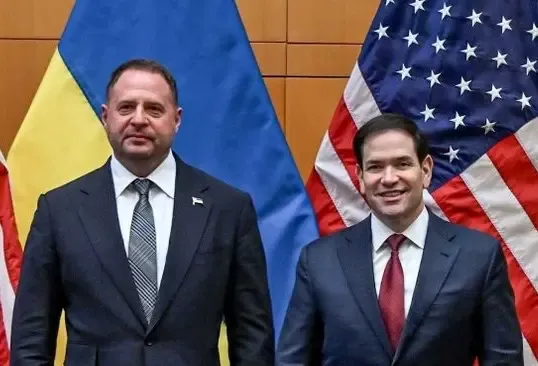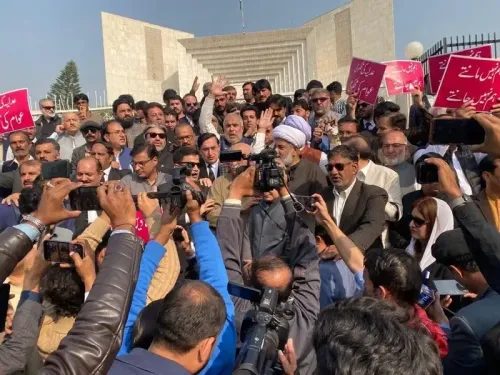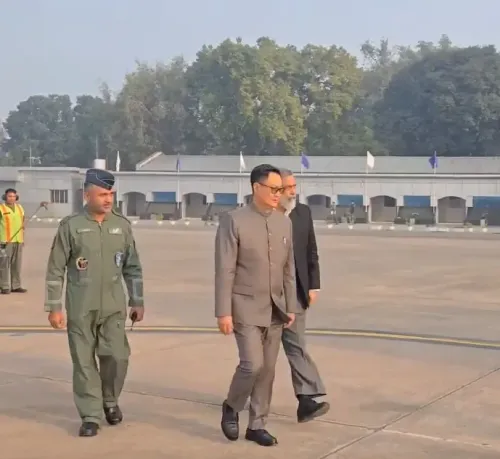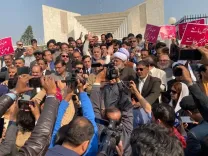Is the US and Ukraine Making ‘Meaningful Progress’ on Trump's Peace Plan?

Synopsis
Key Takeaways
- Progress reported in US-Ukrainian negotiations.
- Concerns regarding the 28-point peace plan's fairness.
- International leaders express opposition to the terms.
- Trump's deadline raises stakes for Ukraine.
- Putin's response is critical for any agreement.
New York, Nov 24 (NationPress) Under pressure from US President Donald Trump to finalize a peace agreement quickly, Ukrainian negotiators have engaged with US officials regarding a 28-point Washington peace plan. Both parties have indicated progress toward a potential deal.
Following a meeting between US Secretary of State Marco Rubio and Andriy Yermak, the chief of Ukrainian President Volodymyr Zelensky's office, in Geneva on Sunday, they issued a joint statement declaring that the discussions were “highly productive” and “showed meaningful progress”.
The peace plan has faced criticism for being biased in favor of Russia, prompting negotiators to seek adjustments to make it more palatable for Ukraine, which has been impacted by Moscow’s military actions.
Trump, who previously claimed he could resolve the Ukraine conflict within 24 hours of taking office, has struggled to achieve this ten months into his presidency, despite successfully brokering a ceasefire in Gaza.
In an effort to expedite a resolution, Trump met with Russian President Vladimir Putin in Alaska last May, but the initiative faltered, leading to a cancellation of a planned follow-up in Budapest.
Putin has described Trump's plan as an updated iteration of proposals discussed in Alaska.
Trump has alternated between harsh rhetoric against Russia and Ukraine, imposing stricter sanctions on Russia last month, while Ukraine is currently under pressure.
He has set a Thursday deadline for Ukraine to agree to the 28-point plan, although he has indicated willingness to be flexible if tangible progress is made.
Moreover, Trump stated that the 28-point plan is not a “final offer,” emphasizing the necessity of resolving the war.
His plan, crafted by Special Envoy Steve Witkoff, would permit Russia to gain control of extensive areas of Ukraine while requiring Ukraine to withdraw from territories still under its control, impose limits on Kyiv's military capacity, and hinder Ukraine's prospects for NATO membership.
Due to its perceived favoritism toward Russia, tensions have emerged within the Western alliance and even within Trump's own Republican Party.
Ten Western leaders, including President Ursula von der Leyen of the European Council and President Emmanuel Macron of France, along with Prime Ministers Mark Carney of Canada, Keir Starmer of Britain, Giorgia Meloni of Italy, and Chancellor Friedrich Merz of Germany, alongside Prime Minister Sanae Takaichi of Japan, expressed their concerns regarding the plan.
“We firmly believe that borders should not be altered by force,” they stated. “We are also worried about the proposed constraints on Ukraine’s military, which would leave it vulnerable to future aggressions.”
Macron, who has communicated with Zelensky, mentioned that European leaders would convene on Tuesday to deliberate on the situation.
Amidst ongoing discussions with Ukraine, Trump unexpectedly criticized the country, claiming its leaders showed “zero gratitude,” and also targeted Europeans purchasing Russian oil.
Zelensky attempted to placate Trump, thanking him and “every American heart” for the assistance provided.
Ultimately, any agreement would require Putin’s endorsement, which, according to Rubio, implies that “the Russians have a say in this matter.”
Putin’s advisor Kirill Dmitriev engaged with Witkoff last month in Miami for preliminary talks on a peace plan.
Dmitriev, who leads Moscow’s investment agency, is under US sanctions and needed special permission to enter the US.
Given the way the plan is structured, Putin appears more receptive to it. He remarked last week during a National Security Council meeting, “Despite certain challenging issues and complications, we nonetheless agree with these proposals and are prepared to demonstrate the flexibility that has been extended to us.”









